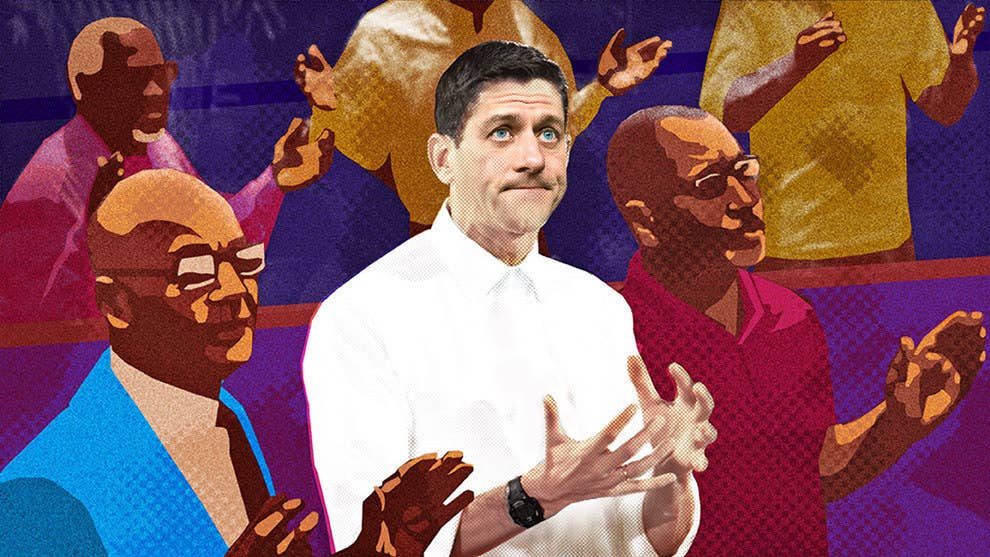
The men begin filing into the Emmanuel Missionary Baptist Church in Indianapolis around 5:30 a.m. They are ex-convicts and reformed drug dealers, recovering addicts and at-risk youth: a proud brotherhood of the city's undesirables. Some of them like to joke that if he were around today, Jesus would hang out with reprobates like them. On this cold April morning, they're getting Paul Ryan instead.
Ryan has been here once before, about a year ago, but most of the congregants rambling in through the front door don't appear to recognize the wiry white guy loitering in the lobby of their church. He is sporting khakis and a new-haircut coif, clutching a coffee as he chats with three besuited associates. A few parishioners come up and introduce themselves to him, but most pass by, exchanging quizzical glances and indifferent shrugs.
After several minutes, a sturdy, smiling pastor named Darryl Webster arrives and greets their guest of honor. "I appreciate you coming," Webster says as he clasps the congressman's hand. "You know, when you get up this early in the morning, it's intentional."
"Usually when I get up this early, I get up to kill something," Ryan cracks.
The words hang uncomfortably in the air for a moment, this not being a congregation of bowhunters. Ryan hastens to clarify. "This is the first time I'm getting up this early without wearing camouflage," he says.
This joke lands, and the collective tension leaks out of the group with a chorus of belly laughs. Webster, on a pastoral reflex, calls up a biblical metaphor.
"Or fishing!" Webster declares. "You know, the early bird gets the biggest fish. And in a real sense, that's what we're doing today. We're fishing."
"That's right," Ryan replies, reverently.
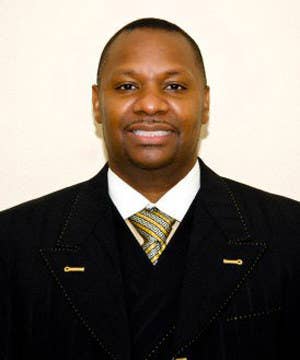
This neighborhood could use more fishermen like Webster. The story of 46218 — a 9.5-square-mile stretch of concrete and crumbling houses on the northeast side of the city — reads like it has been plagiarized from a score of other poor urban zip codes: poisoned by drugs, bloodied by violence, starved of cash. Webster's antidote to his community's ills is a combination of Bible verses and counseling for the neighborhood's underachieving men. His ministry gets people off drugs, puts them through marriage counseling, teaches them how to write résumés, and helps them land good jobs by vouching for them with business owners. Every couple of months, he invites them to a series of early morning spiritual workouts, where they share testimonials, listen to uplifting sermons, and chant refrains in unison, like, "You've got to know yourself to grow yourself," and, "Life is in session, are you present?"
It may not sound like pathbreaking stuff, but Webster's results speak for themselves. Since 2005, he has put about 900 men through the program and nearly 70% of them have overcome an addiction, according to the church. Scores of local men credit Webster with helping them start their careers. The success of this homegrown, up-by-the-bootstraps approach is what has drawn Ryan here twice over the past year as he searches for a conservative cure to the curse of American poverty. It's a quest that has grown increasingly personal, and politically fraught, in recent months. It has also been humbling.
Ryan follows Webster into the spacious, warmly lit chapel, where about 100 men are sitting on paisley upholstered pews, cheerfully chattering as they wait for the proceedings to begin. He is introduced to Ken Johnson, a stout man with a large cross swinging from his neck who serves as the chaplain for the Indianapolis Colts.
Johnson's eyes narrow as he comes face-to-face with Ryan. "I know you," he says, trying to remember from where. "Are you…"
"I'm Paul."
Nothing.
"I'm in Congress," he tries.
"Oh…" the chaplain says, tentatively. "Yeah. OK. I guess that's how I know you."
"Back home, I just tell people I'm the weatherman."
When it comes time for the service to begin, Ryan takes a seat in the front row with a collection of aides and allies. He is accompanied this morning by Bob Woodson, the 76-year-old community organizer who first connected him with Webster; two Indianapolis businessmen who are helping Emmanuel Missionary with its work placement program; a personal aide employed by Ryan's political action committee; and a freelance videographer who is capturing footage of the visit for a vaguely defined future project that Ryan insists he will only "play a bit, bit part in." It's a decent-sized entourage, but even inside the buffer of companionship, Ryan seems acutely aware of his out-of-placeness here.
He sits practically motionless as the service progresses, his long arm draped over the back of the pew, his eyes fixed intently on whoever is speaking. The sermons prompt only the most muted reactions on his angular face. When Woodson declares in an impassioned speech that "in Black America, we have a 9/11 every six months," Ryan turns his eyes downward and mouths, "Wow." And when the pastor ribs some of the men in the audience for the nicknames they used to go by on the street, Ryan laughs along, carefully, with the congregation.
Near the end of the service, Webster invites the audience to stand for a song, and Ryan rises with them. A two-man band on the stage begins to play as lyrics scroll across projector screens hanging on the walls. Most of the men here seem familiar with the routine; Ryan clearly isn't. Still, he bends his arms in the position of "receiving" like everyone else, and begins gently swaying back and forth, like he is slow-dancing in middle school. He opens his mouth ever so slightly — just wide enough to let the words out — and he starts to sing:
Here's my hands, oh Lord.
Here's my hands, oh Lord.
I offer them to you
As a living sacrifice.
The song has several verses, and with each stanza the chapel full of amateur baritones swells with fervor. Ryan remains stone-faced, his eyes dutifully locked on the projector screens. He sings about his "hands," his "heart," his "mind," and finally his "life." And when the band stops and the pastor closes the meeting with a prayer that God will bless Ryan with "understanding as he crisscrosses the country," the congressman's voice seems to grow louder than it has been all morning as he says "amen."
Hours after the final note is sung, Ryan is still self-conscious about how he performed during the devotional. "I'm so goofy with that stuff," he says. "It's just not my thing. I'm Catholic!"
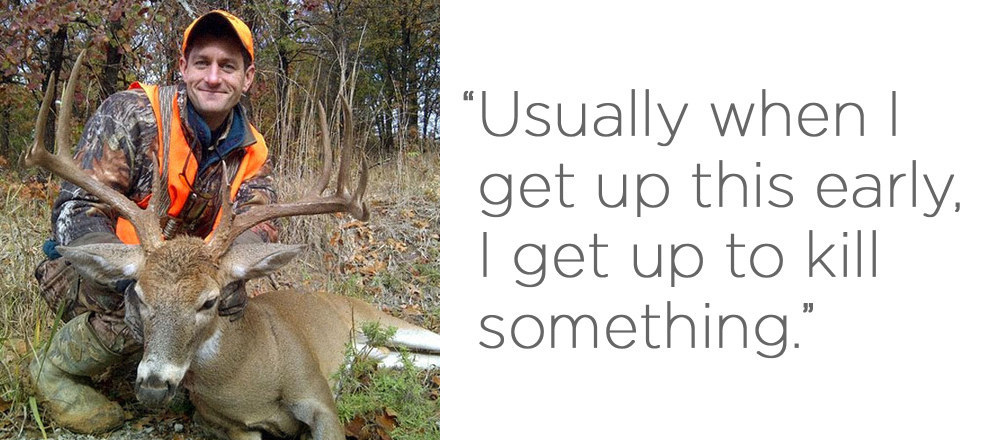
Ryan's visit to Emmanuel Missionary is his 12th such venture into the world of urban poverty since last year. Over the past 14 months, the former running mate to Mitt Romney has toured the country, praying with heroin addicts in San Antonio, and hanging out with former gangbangers in Milwaukee. Like any savvy politician, he began this chapter of his career with a happy ending pre-written: On April 30 he will chair a House Budget Committee hearing loftily titled "A Progress Report on the War on Poverty: Lessons from the Frontlines," and sometime this summer he plans to release a package of conservative anti-poverty proposals that will be trumpeted as the culmination of his work with the poor. His admirers will no doubt use the occasion to celebrate him as a forward-thinking Republican visionary. He will make the rounds on the Sunday morning talk shows. Political reporters will write stories about his rising stock in the 2016 campaign.
But for all the partisan fanfare that awaits, Ryan does not exude the confidence of a man who has it all figured out. His immersion into a world that few in the D.C. political class dare to visit has left him humbled and a bit unnerved — uniquely aware of the scale of his project, and not entirely certain of the way forward.
He also knows how it looks. There is a long tradition in American politics of campaigning in Harlem to win votes in Westchester, and more than one critic has accused him of using disadvantaged people of color as stage props in his political ascent. He's sensitive about this perception, and moves to preempt it almost immediately after we meet in the predawn hours at a downtown Marriott Courtyard, where it's still too early for the mini-muffins and microwavable breakfast sandwiches. I am the first reporter he has allowed on one of these trips, and he spends a good deal of time encouraging me to ignore him.
"This story isn't about me," he tells me. "It's about Pastor Webster and the work he's doing in this community. I'm just an observer."
This is Ryan's trademark Midwestern modesty on full display, the same characteristic that requires him to express aw-shucks puzzlement at the strong feelings his politics inspire. "I don't see why people give such a flip about me," he says. "I'm just a guy in Congress!" But he is also a deeply polarizing figure in Washington and beyond, a fact that has largely filtered the responses to his newfound passion for the poor into two categories: swoons and sneers. The reality is that Ryan, like most politicians, operates in the reality somewhere in between House of Cards and Mr. Smith Goes to Washington, and his political transformation — from right-wing warrior-wonk crusading against the welfare state, to bleeding-heart conservative consumed with a mission to the poor — is one of the most peculiar, and potentially consequential, stories in politics today.
Ryan is doing something rather unprecedented for a Republican: He is spending unchoreographed time with actual poor people. He is exposing himself to the complexities of low-income life that don't fit in the 30-second spot, the outlay spreadsheet, or the stump speech applause line. He is traveling well outside his comfort zone — and it has been uncomfortable.
The inherent friction of this effort came into full view last month when Ryan appeared on a conservative talk radio show to present the findings from his excursions into the forgotten cracks and crevices of American society. He was discussing the challenges of fatherlessness in underprivileged communities when he made the gaffe that launched a thousand think pieces: "We have got this tailspin of culture in our inner cities, in particular, of men not working, and just generations of men not even thinking about working or learning the value of the culture of work," he said. The liberal punditocracy pounced, accusing him of winking at racists by subtly perpetuating a stereotype that African-American men are lazy. He was branded a dog-whistler, a micro-aggressor, a race-baiter. Rep. Barbara Lee issued a statement calling her House colleague's comment "a thinly veiled racial attack," and declaring, "When Mr. Ryan says 'inner city,' when he says, 'culture,' they are simply code words for what he really means: 'black.'" Nancy Pelosi's office piled on, calling Ryan's remark "shameful, disturbing, and wrong." Serious political reporters began calling Ryan's office to ask if the congressman "really hates black people," according to one aide. He eventually engaged in the requisite walkback, admitting his comment was "inarticulate," and taking pains to clear the air with Lee and the rest of the Congressional Black Caucus.
But a month later, Ryan still chafes at the assertions that he is a bigot. While he is accustomed to being labeled a granny-killer for his proposal to overhaul Social Security, this was the first time in his career he had been stamped with the scarlet-letter "R."
"I thought I had been called every name in the book until now," he says, smiling morbidly. "I know who I am and I know who I'm not. And Barbara does too. She does." He adds, "If we're going to get to fixing this problem, we need to allow a good conversation to happen without, you know, throwing baseless charges at people."
When I ask him if he can understand how some people might have honestly interpreted his comment as a racial dog whistle, he thinks about it.
"Dog whistle… I'd never even heard the phrase before, to be honest with you," he says. The admission isn't meant as a dodge, or an excuse. He hails from a state where "diversity" means white people swapping genealogical trivia about their Polish and Norwegian ancestry — his hometown of Janesville, Wis., is 91.7% Caucasian, according to the 2010 census — and he is coming to terms with the fact that he is not equipped with the vocabulary of a liberal arts professor. The fallout from his gaffe has been a "learning experience," he says, one that he predicts conservatives will have to go through many more times if they are serious about building inroads to the urban poor.
"We have to be cognizant of how people hear things," he says. "For instance, when I think of 'inner city,' I think of everyone. I don't just think of one race. It doesn't even occur to me that it could come across as a racial statement, but that's not the case, apparently… What I learned is that there's a whole language and history that people are very sensitive to, understandably so. We just have to better understand. You know, we'll be a little clumsy, but it's with the right intentions behind it."
If the episode has brought Ryan a heightened degree of self-awareness, it has also infected his rhetoric with a persistent strain of insecurity. He is like a singer who has suddenly discovered his lack of relative pitch while on stage, and now worries that every note he's belting out is off-key. As we talk, he chooses his words with extreme care, and is prone to halting self-censorship.
At one point, as he tells me about his efforts during the presidential race to get the Romney campaign to spend more time in urban areas, he says, "I wanted to do these inner-city tours—" then he stops abruptly and corrects himself. "I guess we're not supposed to use that."
His eyes dart back and forth for a moment as he searches for words that won't rain down more charges of racism. "These…these…"
I suggest that the term is appropriate in this context, since it is obviously intended as an innocuous description of place. He's unconvinced, and eventually settles on a retreat to imprecision: "I mean, I wanted to take our ideas and principles everywhere, and try for everybody's vote. I just thought, morally speaking, it was important to ask everyone for their support."
It would be easy to use stuff like this to ridicule him for his tone-deafness, his white-guyness, his sheltered cluelessness. But Ryan, by his own admission, is receiving his sensitivity training in real time. He has charged headfirst into the war on poverty without a helmet; zealously and clumsily fighting for a segment of the American public that his party hasn't reached since the Depression-era shantytowns that lined the Hudson River were named after Herbert Hoover. It is frequently awkward and occasionally embarrassing, but it is also better than staying on the sidelines.
He is well aware that the audacity of his mission has driven some of his detractors nuts. Ryan, like everyone in Washington, claims that he pays no attention to his haters, yet somehow demonstrates remarkable familiarity with them. When I mention one of his most rabid critics in the commentariat, the liberal New York magazine writer Jonathan Chait, he begins to chuckle. "That guy hates me," he says. "I don't even know what he looks like. Never laid eyes on the guy. But he does not like me."
Chait is just the most prolific soldier in an army of liberal political writers whose wonkery came into vogue at the same time Ryan's profile began to rise in Washington. The congressman's budget, which called for dramatically restructuring entitlement programs like Social Security and Medicaid in order to reach a balanced budget, made him a natural villain in their writing, and over the years they have relentlessly prosecuted him with critiques that range from petty and hysterical, to serious and substantive.
When Ryan released his annual budget in the beginning of April, it lacked the poverty-related proposals he had supposedly been honing for the past year. Instead, it was largely a rehash of his past budgets, focused on shrinking the deficit by scaling back federal welfare and entitlement programs. One study by the left-leaning Center for Budget and Policy Priorities estimated that two-thirds of his proposed cuts came from expenditures that benefit low-income Americans.
In a column, Chait quoted from a Washington Post report earlier in the year that said the upcoming Republican budget would "recommend a sweeping overhaul of social programs," and then argued that Ryan's apparent course reversal "reveals something very deep" about him: "His policy vision is fundamentally impossible."
Ryan says the Post story was actually just inaccurate, and that he had never planned to fold his work on poverty into this year's budget (a claim that matches what his office told me late last year). "I've got two roles," he says. "I'm chairman of the House Budget Committee representing my conference … and I'm a House member representing Wisconsin doing my own thing. I can't speak for everybody and put my stuff in their budget. My work on poverty is a separate thing."
But Ryan is fighting a well-drawn caricature of himself as a wolf in bro's clothing — a right-wing radical who disguises his agenda to dismantle the social safety net with an earnest Homecoming King of Congress act.
"I'm so used to that," Ryan says of the personal attacks. "It's just—" he pauses to think for a moment. "The key is you get thick skin, but not impermeable skin so that it changes who you are. You can't get crocodile skin. Then you're, like, a curmudgeon. Believe me, there are a bunch of those in Congress and I don't want to be that. I look at [former Democratic Rep. Dave] Obey, and [Republican Rep. Jim] Sensenbrenner, two guys from my delegation, and I'm like, their skin is so thick, it's impermeable. I can't let that happen to me."
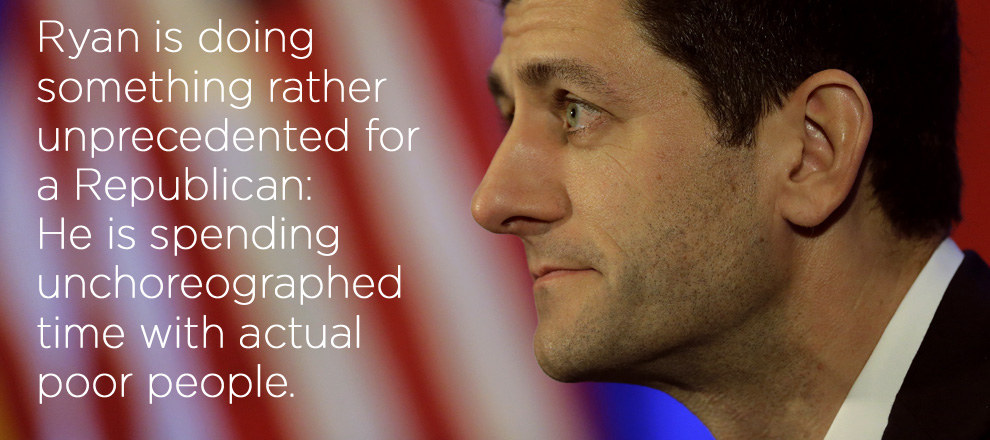
Shortly after the conclusion of the service, Ryan and his entourage make their way to a smaller meeting room on the perimeter of the church, where Pastor Webster has assembled a collection of his greatest success stories — about 30 ex-convicts and onetime troubled teenagers who have become pillars of the community, thanks in part to his ministry. They sit on rows of folding chairs, asking about one another's kids and businesses, and sharing spiritual insights they gleaned from the sermons they just heard.
Ryan quietly takes a seat at the front of the room behind a table that faces the group. The setup positions Ryan as professor, but he makes clear he is here to be educated. When Webster asks him to introduce himself, he slides into a riff he's lifted from a thousand past stump speeches: "What's so amazing about this country is it's the only one founded on an idea, and the idea of this country, which has a lot of flaws and has needed a lot of work … is the condition of your birth doesn't determine the outcome of your life. It doesn't matter who you are or where you came from, you can be who you want to be in this country." He concludes this preamble by pledging allegiance to pragmatism. "We just want to learn so that we can get behind what works."
For the rest of the meeting, the men take turns testifying of Jesus and the power of strong bootstraps.
"I can honestly say I did cocaine in half the houses in this area," says one man, who is clean now and gainfully employed.
"I sold drugs, I've been shot, my best friends have been killed all around me," says another, who spent 13 years in federal prison and now runs a successful car wash.
Ryan is silent as they talk, his elbows planted on the table in front of him, his chin resting on clasped hands. It is not yet 8 a.m. but he's already been awake for several hours and he periodically arches his eyebrows in dramatic fashion, in what looks like a heroic effort to stay awake.
Ryan begins to perk up, though, when a man named Travis stands to speak. He complains that too many of his friends get out of jail eager to rebuild their lives, only to have leads for decent jobs evaporate once employers find out they are ex-convicts. Without viable career paths, they end up settling for a part-time, minimum-wage existence before they eventually turn back to crime to supplement their income.
"We need to try to get those Fortune 500 companies to lower their expectations on background checks to hire these guys," Travis says, as his peers nod in agreement. Ryan is nodding too, suddenly energized by a tangible problem that public policy might be able to address. "You ask any one of these cats out on the street, do you want to work? They don't want to work 'cause they're gonna be making $7 an hour on pump four."
Ryan is still transfixed by the problem of getting jobs for ex-cons when his rental SUV pulls out of the church parking lot after the meeting. "There's a lot to that," he says from the passenger seat. "But the key is that you have to have a validator. Some trusted person who can say to the employer, 'No, no, this dude, this guy is really good.'"
Woodson encourages the congressman's enthusiasm. "This is an area of public policy where we can have an impact," he says. "Because it's true across the country. There are insurance and risk factors but there must be solutions somewhere."
"Exactly!" Ryan exclaims.
There is a familiar, approved narrative of the Woodson–Ryan union: The two men met in the early '90s through their mutual friend Jack Kemp, the Republican Party's big-tent visionary, and reconnected near the end of the 2012 campaign, when Ryan asked him to assemble a panel of grassroots-level advocates for the poor to participate in an off-the-record roundtable.
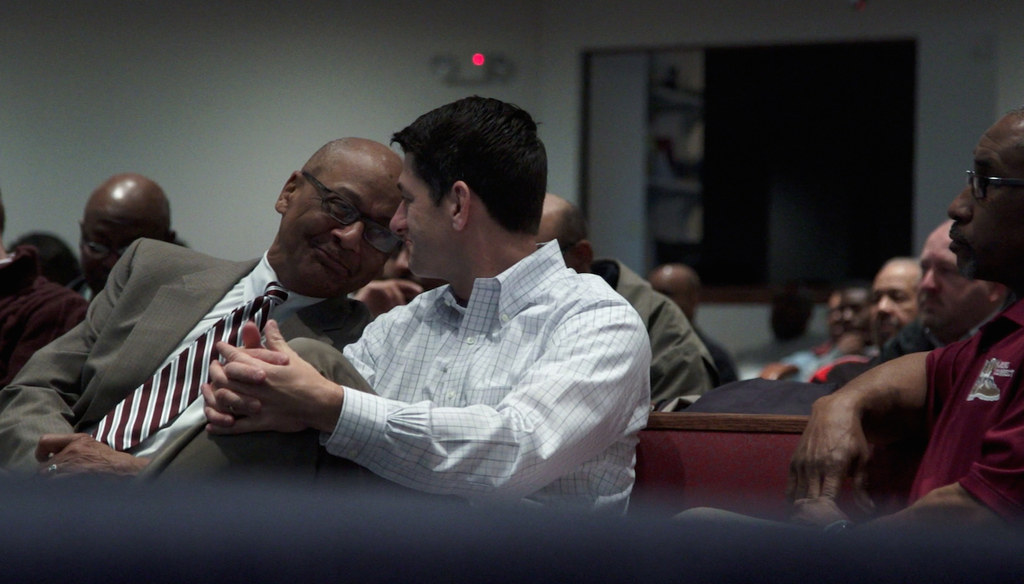
Woodson is a civil rights veteran who parted ways with the movement in the '70s over the issue of forced busing, and went on to found the Center for Neighborhood Enterprise, a nonprofit that provides training and support for local groups working to improve low-income neighborhoods. He is no right-winger — he refers to himself as a "radical pragmatist" when it comes to politics — but his communitarian approach to solving social ills appeals to Republican politicians who are wary of fighting crime and poverty solely by whipping out the federal checkbook. Woodson, for his part, is eager to do what he can to focus the attention of the powerful on the plight of the poor. He has served as Ryan's tour guide over the past year, taking him through inner-city churches and halfway houses to show off the best work activists are doing on the ground. Woodson has been widely described in the press as Ryan's "mentor," but I assumed before seeing them together that it was an honorary title bestowed by the congressman's office out of respect (and an acknowledgement that having an elder statesman of the civil rights movement around gave Ryan a bit of credibility).
In truth, when they are together, Woodson, a gregarious, charismatic man with a preacher's talent for distilling wisdom into catchy slogans, does most of the talking while Ryan listens and takes mental notes. "I plagiarize your sayings all the time," Ryan tells Woodson as we drive. "Like, we have a poverty management system for the benefit of the managers."
"It's provider-driven," Woodson says.
"Provider-driven," Ryan repeats. "Not outcome-based."
Woodson nods, and supplies an example. "There are issues that are very pedestrian but very important," he tells Ryan. "Like, helping people like this keep more of the money that they earn. For instance, my daughter lives in Costa Rica. It costs me practically nothing to call her. It costs me a dollar a minute to call to federal prison."
Woodson waits for a response, but none comes, so he reiterates the point. "These families pay a dollar a minute, Paul."
"Just to call into prison?"
"Yeah!" Woodson says. "I mean, there's a huge rip-off of people in prison, families of people in prison. I have to give my credit card to a company and they come and tell me, 'You have $100 on your account, you have talked for X number of minutes, this is what's left on your card.' And it's about a dollar a minute. I'm telling you, it's crazy!"
"Geez," Ryan mutters.
For a moment, it seems as though this will mark the end of the conversation, but Woodson keeps pressing. "So, that is something, Paul, that we really need to look into. It would reach thousands and thousands of families around this country."
As it turns out, the Federal Communications Commission last year actually banned price-gouging by private companies that provide telephone service for inmates, though prison reformers remain concerned that the same shady practices could be applied to email access and video chat services. But Ryan isn't aware of that now, and while he clearly wants to move on, Woodson seems intent on pushing him just a little bit harder, making him just a little bit more uncomfortable.
"I mean, this is the kind of issue that politicians just don't pay attention to," Woodson says.
"Or even know about," Ryan adds.
"But it would have a profound impact if you were to come out and get interested in advocating for fairness to these families to say they need to keep more of the money they earn."
"That's why we spend so much time on these marginal tax rate issues," Ryan offers, weakly. He seems to realize how the words sound as he says them, and he lowers his voice to complete his sentence. "Which is such a highfalutin spreadsheet thing…"
Woodson cuts him off. "We need to get on issues like this. If you were to come out and talk about this, I'm telling you, people would be shocked!"
"Yeah," says Ryan.
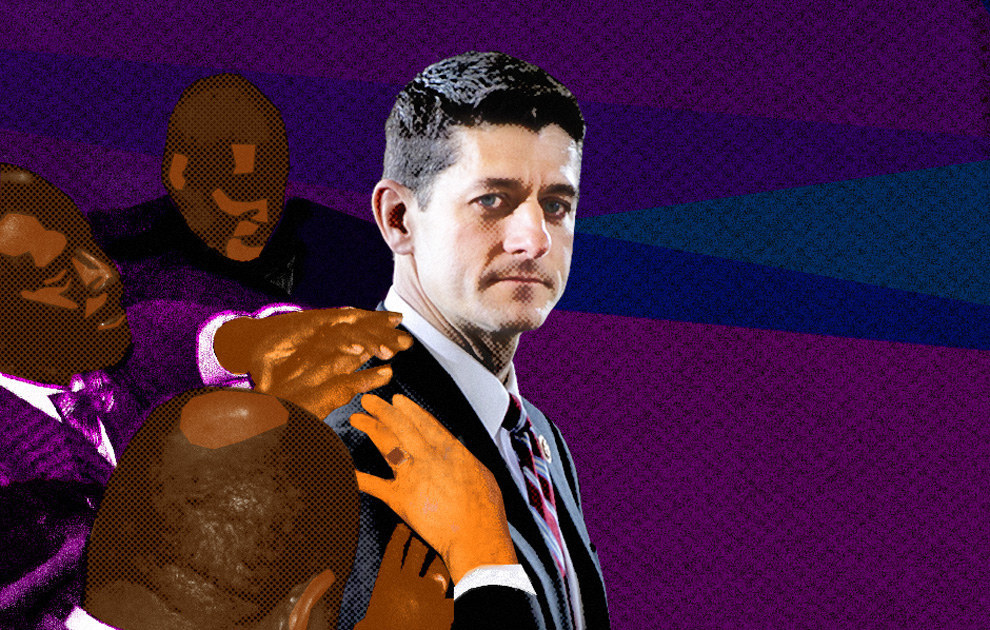
Ryan's fixation on fighting poverty began with a laying on of hands.
It was Oct. 24, 2012, and he was sitting in a high-ceilinged backstage room at Cleveland State University's Waetjen Auditorium. Woodson had arranged for about a dozen activists to meet with him, and Ryan spent the half hour he had managed to carve out of his campaign schedule listening to stories about homelessness and addiction and redemption and relapse. When the testimonials came to an end and Ryan rose to leave, a hulking tattooed minister who had come to the meeting via motorcycle asked if he could bless him before he went. Ryan was taken aback by the request, and not entirely familiar with the ritual, but he obliged.
The group encircled him, and the minister placed his hands on Ryan's shoulders, as the candidate made the sign of the cross. While they prayed over him, he thought about the stories he had just heard: of people miraculously escaping the pit of poverty and then reaching down to pull their brothers and sisters out as well. Several people in the room, including Ryan, grew emotional. "To me, that moment is how the things we believe in and what we're trying to do can really revitalize our country," he recalls now.
Weeks after he lost the election and returned home to Wisconsin, the prayer stuck with him as the single most powerful experience he had on the campaign trail. By the time a close confidant called him over the holidays, Ryan was speaking with the passion of a convert. "I want to figure out a way for conservatives to come up with solutions to poverty," he confided to his friend. "I have to do this."
Ryan's broad vision for curing American poverty is one that conservatives have been championing for the last half-century, more or less. He imagines a diverse network of local churches, charities, and service organizations doing much of the work the federal government took on in the 20th century. Rather than supplying jobless Americans with a never-ending stream of unemployment checks, for example, Ryan thinks the federal government should funnell resources toward community-based work programs like Pastor Webster's.
Ryan likes to frame this approach as a natural extension of his Catholic beliefs. Good public policy, he argues, balances the doctrines of solidarity — Christian empathy for the weak among us — and subsidiarity, which favors individual freedom and local governance over concentrated central power. It's the standard-issue conservative Catholic method of reconciling concern for the poor with suspicion of federal welfare programs. But it also conveniently leaves out sections of the catechism that don't quite square with the Republican Party's platform, like support for labor unions. In any case, he has drawn inspiration from Pope Francis' emphasis on serving the needy, and his warnings against the societal isolation of the poor — even as those teachings have prompted Rush Limbaugh to decry the pontiff as a Marxist.
"I think with the pope, some of the right started to take their message and some of the left tried to take their message, and they tried to use him to validate their points of view," Ryan says. "Which is really the opposite of what he's trying to accomplish here." The pope, he argues, is trying to "detoxify this debate and make it a discussion" — a mission he now shares.
Still, Ryan admits he hasn't quite figured out how to paint a compelling picture of his vision for the public. George H.W. Bush memorably likened local volunteer organizations and charities to "a brilliant diversity spread like stars, like a thousand points of light in a broad and peaceful sky." Ryan, by contrast, has been working on a metaphor that involves pollination, but he hasn't quite nailed it down. In the meantime, he has fallen back on the familiar vocabulary of politics past, describing his vision as "civil society." But he adds, "We need to find a better term. Nobody knows what that means." Meanwhile, one of his favorite lines — "We need to make redemption cool again" — seems stale and sort of confusing. Has redemption become uncool?
If his rhetoric lacks poetry, his arguments against the current state-centric approach to aiding the poor is compelling. Since Lyndon B. Johnson declared a "war on poverty," the U.S. government has spent an estimated $13 trillion on federal programs that have resulted, 50 years later, in the highest deep poverty rate on record. The failure, Ryan contends, is in the notion that anti-poverty programs are best managed from the top, with Washington bureaucrats crunching numbers and then issuing lowest-common-denominator directives. "It's this premise that you've got to sit in D.C. and you can just have a really enlightened, benevolent bureaucracy that can figure all this stuff out," he says, adding, "It's well-intended. But it's so, to me, paternalistic and arrogant and really kind of condescending. It doesn't work, and it's sort of debilitating. It takes the creativity out of communities, out of people."
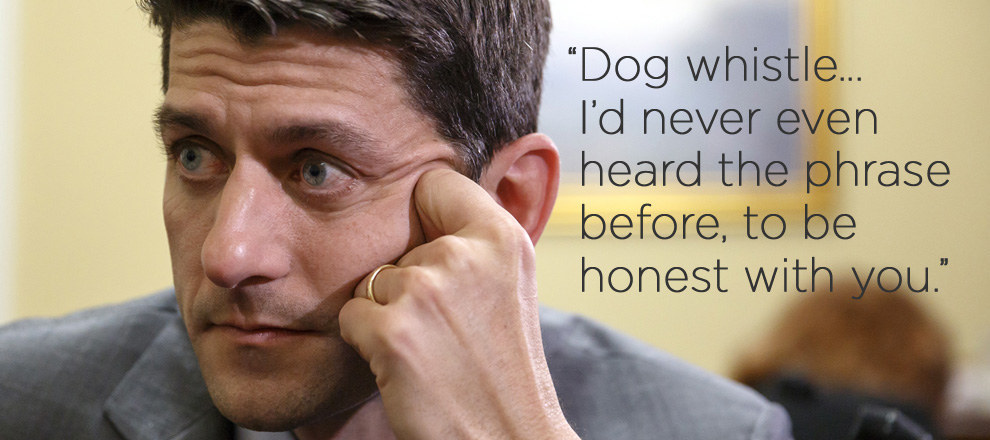
At around 8 a.m., Ryan arrives at The Skyline Club, a private eatery suspended 36 stories in the air, with floor-to-ceiling windows showing off the best downtown views Indianapolis has to offer. At night, the restaurant serves $42 filet mignon and plays host to the city's elite who wish to mix and mingle in the sky. This morning, the floor has been roped off, and a couple dozen wealthy Republicans have gathered to glad-hand with the congressman. Indiana Gov. Mike Pence is here too, and together, he and Ryan form dueling centers of gravity, with well-dressed white people being sucked into one or the other's orbit.
Ryan, who donned a neatly pressed blazer on his way into the building, is in his element here, joking about University of Wisconsin's Final Four defeat yesterday, and playing a six-degrees-of-separation game that connects the event's attendees with the various rich and powerful allies he has collected over the years. Thanks largely to a trust Ryan's wife, Janna, inherited in 2010, the couple's net worth is estimated to total between $2 million and $7.7 million, which means that while Ryan is far from the wealthiest member of Congress, he has no trouble fitting in with Indiana's Republican money crowd.
Ostensibly, the purpose of this meeting is to raise money for Woodson's Center for Neighborhood Enterprise, and to encourage local business owners to take a chance on Pastor Webster's band of prodigal sons. But the venue also provides Ryan with an ideal setting to pitch his Kempian vision for a Republican Party that champions America's marginalized, and he seizes the opportunity.
"Look, I'll be really brief," Ryan says once everyone has taken their seats around a long rectangular table. "As conservatives, we've become complacent with the caricature that's been placed upon us. What we're simply trying to do is get back to the roots and get back to the basics, to take these great ideals and principles that made this country so special in the first place and regenerate them."
It's a nice sentiment, and one that everyone seems to agree with in theory. Pence, Woodson, Ryan, and a number of other men take turns saying nice things about each other, and sharing faith-affirming stories about people who have been saved by the type of conservative approach to poverty-fighting that they advocate. But as the conversation progresses, the seams of this happy coalition start to show.
It begins when the owner of a local factory named A.J. Bir complains that his efforts to hire employees from the poor neighborhood of Martindale-Brightwood have resulted in a subpar workforce. "It's 60% African-American in the back half of the shop," Bir says. "The education system has just failed them. A lot of them can't read, they can't do basic math, they've never been disciplined before, so they don't know how to follow a process … So, I see what you're saying, and I'm on it, I'll drink the Kool-Aid. But, do you see what I'm saying?"
If Woodson objects to Bir's characterization of his black employees, he demonstrates remarkable restraint. He encourages Bir to lean on Emmanuel Missionary as a resource for identifying dependable workers, and to put some his current employees through Pastor Webster's boot camp.
The exchange is amiable enough, but as Woodson continues to talk, his rhetoric grows sharper, and increasingly critical of the right. He expresses frustration with conservative scholars because "all they talk about is how many people in these communities are having babies out of wedlock." And he takes a shot at right-wing pot-stirrers like Rush Limbaugh. "I'm probably going off message here, but it bothers me that the conservative movement is being defined by talk radio," he says. "Their goal isn't to heal this nation, and that's not what makes them celebrities. What makes them celebrities is to continue to talk about grievance." Somebody mentions that Pence was once a conservative talk radio star, and a few people laugh nervously.
Throughout all of this, Ryan stares at a spot on the table in front of him. He looks tired. After more than a year of trying to lead a national conversation about the causes and consequences of poverty, what he's gotten is a dogfight. Even among this group of allies, competing grievances simmer beneath the surface, threatening to overtake the fragile friendliness of the conversation.
Woodson is still sermonizing. "There's a thirst on the part of the American public for these kinds of efforts," he says. "A real thirst. And they're tired of the gladiatorial combat that masquerades as political debate."
"Yes," Ryan says, breaking his silence. "We all are."
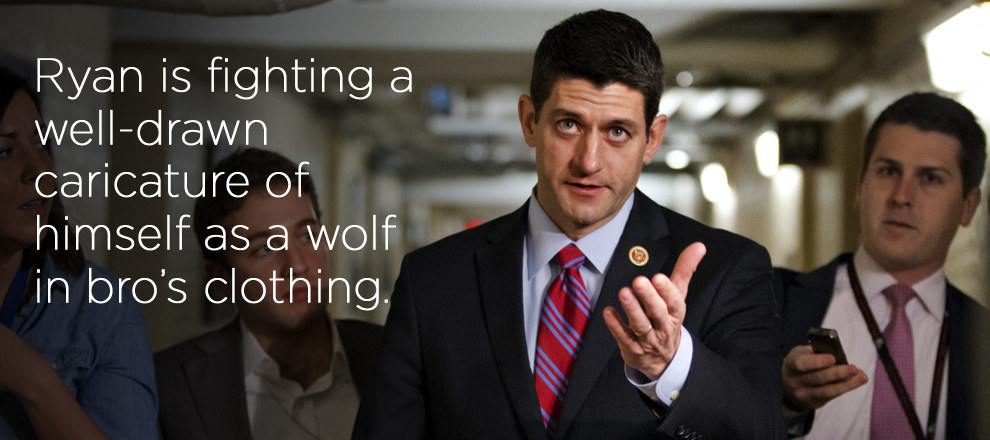
A couple hours after the fundraising breakfast, I squeeze into a U.S. Airways window seat next to Ryan, and we spend a few minutes rearranging laptops, limbs, and complimentary beverages until we are coach-comfortable. As we cruise toward Washington, Ryan works to reorient his frame of mind, away from the heady work of saving 46218 and toward the more pressing political battles of the moment. Like any tourist, it takes him some time to get reacquainted with home after these trips, and when he returns he tends to see things a little differently. He is more grateful for the perks and pleasures that come with a bulging bank account, yes, but he also sees certain issues in a new light.
At one point in our discussion, I ask him about a pair of Supreme Court cases that seek to settle how the Obamacare contraceptive mandate should apply to religious nonprofits like the Little Sisters of the Poor, and private companies owned by religious individuals, like Hobby Lobby. The debate has become a classic culture war battle, with the right framing it as an assault on religious values, and the left crying "war on women." Ryan is sympathetic to social conservatives' arguments, but he sees the issue primarily as another dire example of civil society's unraveling — an attempt by the state to crowd out certain charities and private employers from the public square.
"That's a big deal to me," he says. "What I think is happening is an assault on the First Amendment in this case, which will dramatically shrink civil society. It's all interconnected."
He disowns what he calls the left's favorite "straw man argument" — that conservatives favor a "dog-eat-dog society" driven by "rank individualism." Government should of course play a supporting role in providing access to education, health care, and retirement security, he says. But the state's primary job should be to encourage community-based solutions to these problems.
I mention that for all his conviction, religious freedom hasn't exactly been central to the national GOP's midterm message.
"I don't go on TV and blare about it as much because you look like you're just grandstanding," he says, adding, "We realize that a public relations war on this issue doesn't work out for us."
As we begin to descend, turbulence rattles the plane, forcing us to steady the items on our tray tables. "This is a rough flight," Ryan says. "My wife would be digging her nails into my arm right now." With our time winding down, I ask him if he has any regrets about the way he's approached this project. He responds that he's most disappointed that he and his Republican colleagues didn't focus more deliberately on the problem of poverty a long time ago.
"You know, identity politics has done a pretty good job of making it appear as though we don't have solutions or that we don't care for the destitute, for the isolated, for the poor, for the person that's made mistakes in their life…"
"For the 47 percent?" I ask.
He winces. "Yeah, but I don't like to say that. I don't like to use that word."
Ryan is a good soldier, and so he declines to take the bait and bash the nominee who made him a national name. But there's no question Ryan's recent efforts have been at least partly defined in opposition to the way Romney carried the Republican banner in 2012. Indeed, in the past year Ryan's work has helped inspire a number of GOP all-stars, including Sens. Marco Rubio, Mike Lee, and Rand Paul, to start talking about how a conservative agenda might serve the nation's poor. At least in rhetoric, the party has come a long way since, "I'm not concerned about the very poor."
Ryan says he wishes their campaign had spent more time appealing to low-income voters, but that the problem started well before the last election.
"I think that by the time it got around to 2012, it was a little too late," he says. "It wasn't, 'Oh gosh, four months to go, let's get this right now!' It's not a box-checker at the end of a campaign. It's a consistent and continual thing. It just atrophied in our party. And I was part of that atrophy. I focused on budgets and economics, macroeconomic policy, because that was sort of the crisis in front of us."
"I think we all, as a party, just fell away from that."
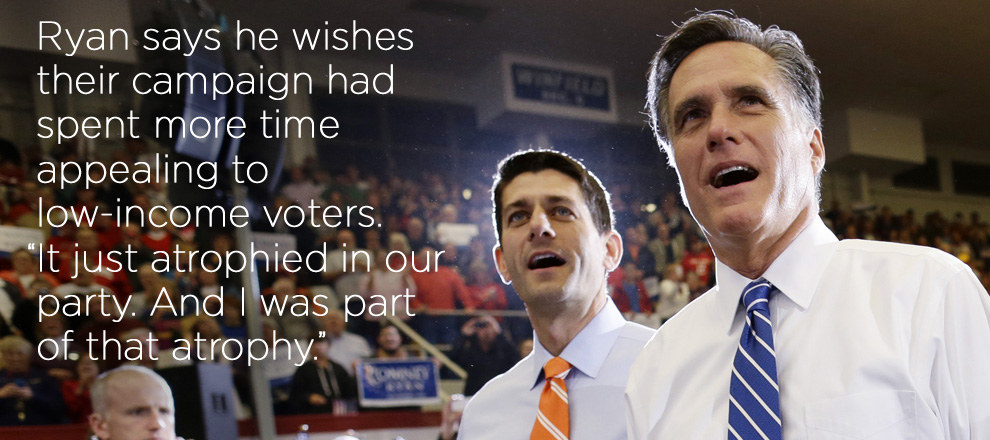
When we land at Reagan National Airport a little before 1 p.m., Ryan still has an entire day of meetings ahead of him. He offers to give me a ride to the Capitol, and I follow him through a terminal, out an exit, and across a rainy parking lot, as he catches up on email on his iPhone. We arrive at the car Ryan drives while he's in Washington, a forest green Chevy Tahoe that has all the trappings of a quintessential bachelor's vehicle. The back is adorned with a Green Bay Packers hitch cover. Inside, a pair of sunglasses sits amid wrappers and crumbs in the center console. Old copies of his budget are strewn across the back seats.
As he drives, conscientiously, toward his office in the Longworth Building — where he works most days and sleeps most nights — Ryan talks himself through the next few hours, searching for the nearest hole in his schedule that he might use to change into a suit. We pull into a crowded underground parking garage, and as we turn a corner he announces, "It's there!" He expertly navigates his SUV into a tight parking spot that he says most people don't know about. In the coming days and weeks, the House of Representatives will pass Ryan's budget along party lines, and a war of partisan rhetoric will ensue. He will fend off accusations from Democrats who say he's shredding the social safety net to ribbons, and hurting the very people he claims to want to help. He will meet with the Congressional Black Caucus in an effort to make peace, and he will make plans for his next excursion with Woodson. It will be noisy and messy, and Ryan will fight and fumble his way through every ugly inch of it.
But for a brief moment, before he unbuckles his seatbelt, he seems relieved to be back on home turf — surrounded by debris of his making, comforted by the familiarity and serendipity of a tiny refuge that feels like his own.
Ryan introduces himself at Webster's boot camp. Video courtesy of Prosperity Action, Inc.
